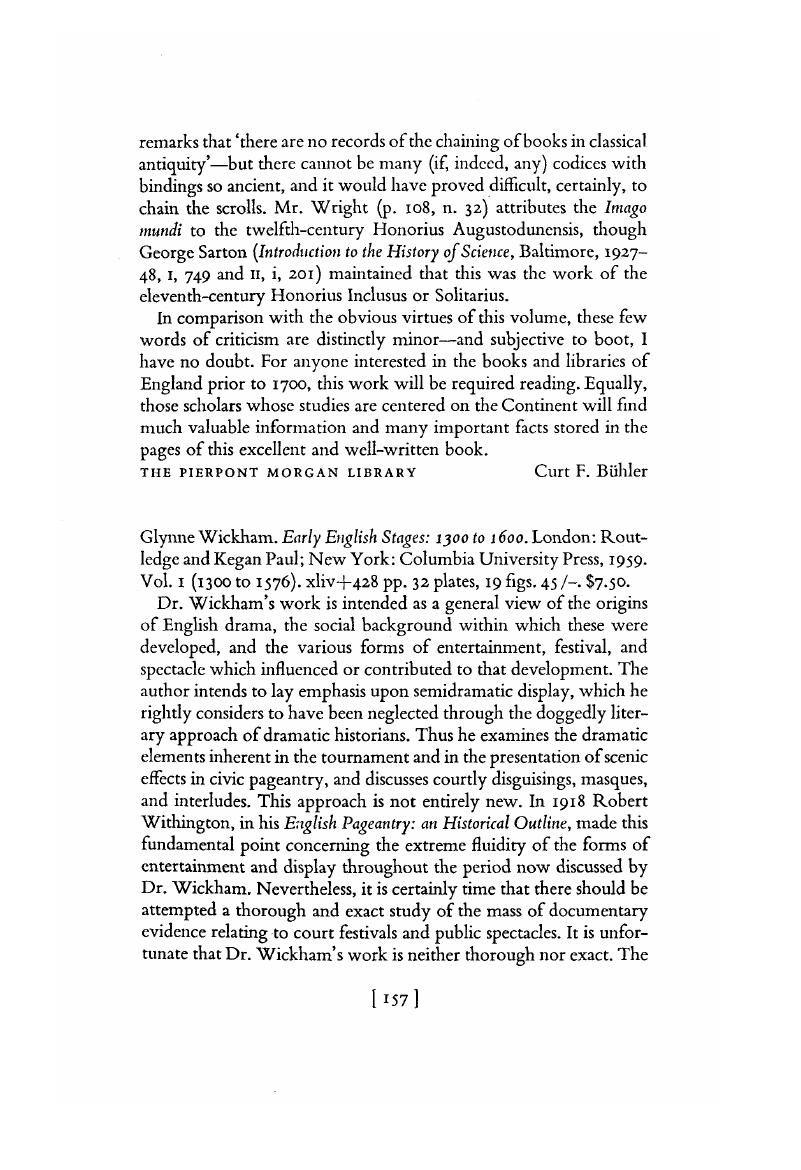No CrossRef data available.
Article contents
Glynne Wickham. Early English Stages: 1300 to 1600. London: Routledge and Kegan Paul; New York: Columbia University Press, 1959. Vol. 1 (1300 to 1576). xliv+428 pp. 32 plates, 19 figs. 45/-. $7.50.
Published online by Cambridge University Press: 20 November 2018
Abstract

- Type
- Reviews
- Information
- Copyright
- Copyright © Renaissance Society of America 1960
References
1 College of Arms MS. 1st M.13. Similar instances may be located almost at random within this book. Dr. Wickham cites (p. 29), for an account of the tournament for the creation of Prince Henry Duke of York in 1494, B.M. Cotton, MS. Julius B. xii. But this has been faultlessly transcribed in so accessible a work as J. Gairdner, Letters and Papers illustrative of the Reigns of Richard III and Henry VIII (London, 1861), as has the draft scheme of the arrangements for the reception of Katharine of Aragon which Wickham persists in citing as B.M. Cotton, MS. Vespasian C.xiv. Cotton.Julius B.xii is also cited (pp. 53, 71, etc.) as the source for the pageants of Henry vii's provincial tour in 1486. But all this material was published in John Leland, De Rebus Britannicis Collectanea, ed. T. Hearne (London, 1770), iv. For the description of the pageants at Bruges in 1468 Wickham cites (p. 92) Cotton. MS. Nero C.ix which is transcribed, with collations, in Bentley's Excerpta Historica (London, 1833). Then (pp. 106,285, 289) Guildhall MS. 3313 is cited as the Great Chronicle of London. This was published, in an impeccable edition, by A. H. Thomas and I. D. Thornley, The Great Chronicle of London (London, 1938). Then again the author states (p. 362, n. 17) that a great part of the information concerning English tournaments is to be found in B.M. MSS. Harleian 69 and Lansdowne 285. Why does he not point out that these MSS. have been summarized and largely transcribed in F. H. Cripps-Day, The History of the Tournament in England and France (London, 1918)? And so on.
2 The Princess Margaret who married Charles of Burgundy in 1468 was not Edward's IV's daughter (p. 92) but his sister. Elsewhere Wickham does get this correct (p. 366, n. 74). The great Anglo-French festivals at Greenwich were not in 1528 (p. 219) but in 1527. The tournament of Noseroy was not held in 1510 (p. 382, n. 52) but over Christmas 1519/20. And so on.
3 B.M.Cotton.MS.Titus A.xvii.
4 Concerning the pageants of 1501, Dr. Wickham asserts (p. 74) that they were a notable expression of the Arthurian theme in British History. In fact the British History is of small significance in this pageant series, which is much more concerned with the astrological and cosmological implications of the Prince Arthur/Arcturus parallel.
5 See A. Hyatt Mayor, La Scenografia prima del 1700 in Tempi e Aspetti della Scenografia (Turin, 1954), pp. 17, 20.
7 For example, in 1240 Ulrich von Liechtenstein took the part of Arthur and jousted with various knights representing Lancelot, Tristan, etc. (Frauendienst, ed. Reinhold Bechstein [Leipzig, 1888], stanzas 1416, 1430, 1437 et al.). At Acre in 1286 knights disguised as women, monks, and nuns fought amongst each other in a tournament (Gestes des Chiprois, ed. G. Raynaud [Geneva, 1887], p . 220). In England too, as early as 1288, there was a tournament near St. Botulph where ‘vna pars in habitu monachali veniret et altera in habitu canonicali'. See The Chronicle of Walter of Guisborough, ed. Harry Rothwell (Camden Society, 1957), pp. 224-225.
8 At the coronation tournament of Henry VIII, in June 1509, there were speeches by Pallas on behalf of the Challengers and by a gentleman on behalf of the Answerers who appeared as servants of Diana (Hall, pp. 510-512). In 1503 during thejourney of Princess Mary to Scotland there was a tournament commenced by an altercation between two knights, one of whom accused the other of stealing his paramour (Leland, Collectanea, iv, p. 288). For a continental example, it is sufficient here to refer to the Pas ie I'Arbre d'Or held at Bruges in 1468—the greatest of Burgundian festivals. This tournament had an elaborate mise-en-scene against which were set the ceremonial entrances of the knights which took semidramatic form with speeches, poetry, and music. See Olivier de la Marche, Memoires, ed. Beaune and d'Arbaumont (1883-88), iii, pp. 101 ff.
9 There is really no excuse for missing this material. There survive three copies of Gibson's rough draft Revels Accounts and a fair copy of the volume recording the disbursements by Sir Henry Guildford and Sir Thomas Wyatt. These documents have been reasonably well calendared in J. E. S. Brewer, Letters and Papers, Foreign and Domestic of the Reign of Henry VIII, iv, nos. 3097 and 3104. Of course the calendars miss much important material but, at least, give a lead that should not be ignored. Has Dr. Wickham never consulted L. & P.? He cites the calendar via Chambers (pp. 372-373. nn. 6 and 7)—why not use it? Better still, why not follow their lead to the Public Record Office?
10 In this connection the round house, built at Calais for the entertainment of the Emperor Charles v in 1520, should be studied. See my forthcoming article ‘Lc Camp du Drap d'Or et les entrevues d'Henri vm et de Charles-Quint', which is to be published in La Com de Charles-Quint et la Culture de la Renaissance, ed. by Jean Jacquot for l'Association Internationale des Historiens de la Renaissance.
11 I have discussed the surviving accounts and transcribed all payments relating to court festivals in an article ‘The Court Festivals of Henry vn: a Study based upon the Account Books of John Heron, Treasurer of the Chamber', which is to appear in the Spring i960 issue of the Bulletin of the John Rylands Library. In an article, “William Cornish in a Play, Pageants, Prison and Polities', to appear in The Review of English Studies, I have dealt with Hault and Pawne in connection with the preparations for the court entertainments of November 1501.
11 I have discussed the surviving accounts and transcribed all payments relating to court festivals in an article ‘The Court Festivals of Henry vn: a Study based upon the Account Books of John Heron, Treasurer of the Chamber', which is to appear in the Spring i960 issue of the Bulletin of the John Rylands Library. In an article, “William Cornish in a Play, Pageants, Prison and Polities', to appear in The Review of English Studies, I have dealt with Hault and Pawne in connection with the preparations for the court entertainments of November 1501.




